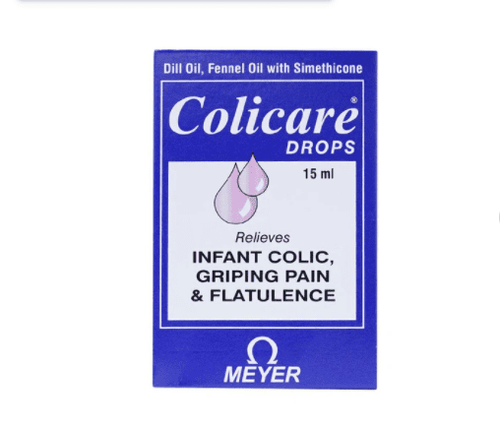This is an automatically translated article.
The article is professionally consulted by Master, Doctor Doan Ngoc Quynh Tram- Pediatrician - Neonatologist - Department of Pediatrics - Neonatology - Vinmec Nha Trang International General Hospital.Colic in babies is not a disease and does not affect the health of the child much, but this condition causes a lot of difficulties for the child and stress for the parents.
1. What is infant colic?
Colic in newborns (also known as Colic syndrome) is a condition in which a healthy baby has sudden, prolonged, unexplained crying spells that parents can't, despite their best efforts. coax. Infant colic is defined as crying for more than 3 hours a day, more than three days a week, for more than 3 weeks, and other causes have been ruled out.Neonatal colic is not a disease and does not cause much harm to the child's health, but this syndrome causes many difficulties for infants and parents. Colic in newborns is a very common phenomenon, occurring in 1 in 5 babies born, usually appearing when the baby is 2-3 weeks old or 2-3 weeks after the due date if the baby is born. young. This condition occurs equally in boys and girls; breastfed and formula-fed infants; term infants and premature infants; first babies and later babies.
2. What are signs of infant colic?
Crying is a very normal phenomenon of babies. Babies often cry when they are wet, hungry, scared, and tired. Crying can be seen as a communication tool for babies, helping them to signal to others about their needs. However, when children have colic syndrome in babies, their crying has unusual features such as:Babies cry a lot, lasting, often at the same time of day, most often in the afternoon late and evening. Signs of infant colic are easy to see, is the baby's cry is loud, high-pitched, more intense than normal crying. Feeling like the child is in pain or screaming. A baby's crying starts and ends suddenly. Babies may suddenly start crying even though they were previously happy, nursing, or even sleeping. Children are very difficult to comfort, despite all the efforts of parents. Parents may notice the child's fists clenched, back arched, stomach stretched, face flushed, alternating legs flexed toward abdomen and legs extended. Some babies may have periods of silence, but most babies cry continuously. The crying may end when the baby passes gas or has a bowel movement.
3. How long does colic in babies last?
Fortunately, neonatal colic is only a temporary phenomenon. Persistent crying in babies tends to peak at 6 weeks of age, and then gradually improves. About 80-90% of babies will be gone by 4 months of age. The rest of the children will stop this phenomenon by the time they are 5 months old.
4. Causes of colic in babies
Although there are many studies on this issue, up to now, the real cause has not been elucidated. Colic in babies is still considered one of the great mysteries of children. No one knows why some babies have colic while others don't. Some hypotheses put forward are:Maternal smoking : Babies born to mothers who smoke during pregnancy or after birth have a higher risk of colic in the newborn than other children. However, this risk is reduced if the baby is breastfed. Babies are sensitive to their surroundings: Some experts say that, in the evening, when babies can't see any sights, sounds or sensations, they become scared and cry. Children with digestive problems: Children have gas; Children eating too much, too little or because their digestive system is not yet mature can all be the cause of the signs of colic in babies. To limit this situation, parents should make sure that the child does not swallow too much air when breast-feeding or bottle-feeding by holding the baby upright when feeding, burping the child after feeding,... Children are allergic to ingredients in milk: Between 2 and 3% of infants have colic due to an intolerance or allergy to cow's milk protein. Consult your doctor if you think your baby is sensitive to ingredients in milk. If your baby is formula-fed, your doctor may suggest switching to a hydrolyzed formula that's right for your baby's condition. Gastroesophageal reflux disease (GERD): This is a condition in which acid refluxes from the stomach into the esophagus, causing damage to the esophagus, larynx, mouth, ... This condition can lead to symptoms of abdominal pain. in infants. If your child spits up frequently, seems uncomfortable, or isn't growing as expected, take your child to the doctor for an examination and treatment. Imbalance of gut microbiota: Studies have shown that infants with colic have a different gut microbiome than those without colic, in that the number of beneficial bacteria is reduced. High serotonin levels: Some studies have shown that, in some babies with colic, the body produces more serotonin than others. Serotonin is a neurotransmitter that helps the brain control a number of body activities, but serotonin also causes intestinal muscles to contract, causing abdominal pain. More research is needed to confirm the link between serotonin and abdominal pain. Maternal stress: Many studies have found a link between mothers with anxiety disorders and excessive crying. There is also a link between colic in babies and mothers experiencing stress and depression during pregnancy. Therefore, if the mother is struggling with anxiety or depression, seek medical help, which will help both mother and child.

5. What to do when babies have colic?
Because colic in babies is a very common condition, what to do with newborn colic is a concern of many parents. When babies cry too much, parents should take the baby to see the doctor. The doctor will do a thorough examination to look for potential causes of abdominal pain such as intestinal problems, urinary tract infections, etc. The doctor will also check to see if the baby is nursing and developing develop normally or not.Newborn colic what to do? If the doctor does not find any abnormalities and diagnoses the baby with colic syndrome, parents can apply some of the following methods to soothe the baby:
Gentle massage: some babies may feel comfortable being gently massaged by their parents. However, some children feel more uncomfortable because they are overstimulated, so during the massage, parents should pay attention to how the child reacts. Gentle motions to hold your baby: Gentle movements can soothe a crying baby, so try holding your baby in a slightly elevated position, close to your chest and heart rate, hold your baby close, and walk gently. Parents can also hold the baby and sit on the swing, gently moving, if the baby falls asleep on the swing, move the baby into the crib. Try different positions: if you're holding your baby in your arms, you can try a more upright position or even try having him lie on his stomach on your lap to see if he prefers one position to another. Take your child outside: if your child is indoors, taking them outside for a walk can be helpful. Fresh air, new sounds, and smells can distract your baby, and the rhythmic movement of your steps can help ease your baby to sleep. Put your baby in a warm bath: giving your baby a warm bath while he or she is crying can be distracting and relaxing. Some infants can be soothed by spraying a hand-held water hose on their backs. Give your baby a pacifier or even give him a finger to help calm him down. Burp your baby: when crying lasts a long time, babies tend to swallow air while crying, which makes babies more gassy and uncomfortable. Parents should regularly burp their children to relieve colic due to bloating. Warm compresses on the baby's belly: Some babies find it comfortable to have a warm compress on their stomach. Pour warm water into a bottle, wrap the bottle in a towel, and place it on the baby's stomach. Give your child probiotics: Colic in babies can be caused by bacteria in their gut that are different from those of other babies. Several studies have shown that probiotics help reduce colic symptoms in breastfed babies. Consult your doctor about the use of probiotics for children. In addition to probiotics, some anti-colic medications (such as Simethicone) are quite safe and can be used to treat colic in babies. However, consult your doctor before giving any medicine to your child. Caring for a baby with colic is very difficult and stressful. While waiting for the child's condition to improve, parents should take care of and comfort the child as best as possible, and at the same time learn to take care of themselves. Parents should arrange to take turns taking care of the children, or if they are too tired, ask grandparents and relatives to take care of the children so that they can rest for a short time.
As a key area of Vinmec Health system, Pediatrics Department always brings satisfaction to customers and is highly appreciated by industry experts with:
Gathering a team of top doctors and nurses in Pediatrics : consists of leading experts with high professional qualifications (professors, associate professors, doctorates, masters), experienced, worked at major hospitals such as Bach Mai, 108.. Doctors All doctors are well-trained, professional, conscientious, knowledgeable about young psychology. In addition to domestic pediatric specialists, the Department of Pediatrics also has the participation of foreign experts (Japan, Singapore, Australia, USA) who are always pioneers in applying the latest and most effective treatment regimens. . Comprehensive services: In the field of Pediatrics, Vinmec provides a series of continuous medical examination and treatment services from Newborn to Pediatric and Vaccine,... according to international standards to help parents take care of their baby's health from birth to childhood. from birth to adulthood Specialized techniques: Vinmec has successfully deployed many specialized techniques to make the treatment of difficult diseases in Pediatrics more effective: neurosurgery - skull surgery, stem cell transplantation. blood in cancer treatment. Professional care: In addition to understanding children's psychology, Vinmec also pays special attention to the children's play space, helping them to have fun and get used to the hospital's environment, cooperate in treatment, improve the efficiency of medical treatment. If you have a need for consultation and examination at Vinmec Hospitals of the national health system, please book an appointment on the website for service.
Please dial HOTLINE for more information or register for an appointment HERE. Download MyVinmec app to make appointments faster and to manage your bookings easily.
Reference source: babycenter.com













